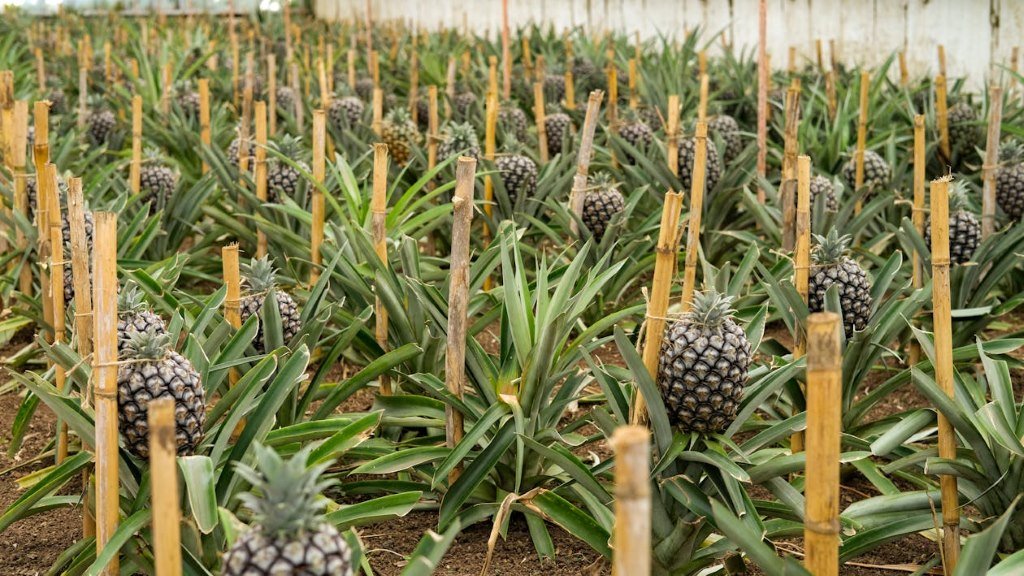The Food and Agriculture Organization of the United Nations (FAO), in collaboration with Dimitra, has introduced a new mobile application to support Indigenous pineapple farmers in Suriname. This app, part of the FAO ELEVATE PROGRAMME through the Office of Innovation, is designed to empower smallholder farmers with sustainable farming techniques to enhance organic pineapple production in the region.
Technology for Sustainable Pineapple Farming
Through this application, developed with Dimitra’s blockchain-based technology, Surinamese farmers gain access to advanced tools such as mechanical land preparation and artificial flower induction, essential for producing premium organic pineapples that meet market demands. Blockchain’s immutable and traceable properties allow for a seamless, transparent tracking process from cultivation through to market, offering secure records of farming practices that align with sustainable standards.
Comprehensive Data and Traceability Features
The app enables a full digital profile of each farmer, registering demographic and plot details, tracking crop activities, and managing harvests with end-to-end traceability. With these tools, farmers can monitor their production and supply chain processes comprehensively, gaining essential insights to improve productivity and enhance market competitiveness. The app’s data features aim to bridge Surinamese farmers to premium markets that require rigorous compliance, opening new economic opportunities for Indigenous communities in remote areas.
ASTA Suriname and Economic Growth
Since 2018, FAO has collaborated with UNIDO, ILO, and UNFPA through the Agrifood Systems Transformation Accelerator {ASTA} Suriname initiative, focusing on modernizing Suriname’s pineapple sector, a vital component of the country’s economy. Supported by the Joint United Nations Sustainable Development Group (UNSDG) Fund, ASTA Suriname has facilitated farm analysis and preliminary implementations to bolster the production of fresh and processed organic pineapples. This initiative aims to transition away from outdated methods with minimal value-addition towards practices that support large-scale, high-quality exports.
Funding and Local Launch
The app’s development was funded by the 2024 Elevate Grant Programme of FAO, which supports innovative projects for smallholder farmers. Scheduled for launch in early December 2024, the app will be available in the local language to ensure accessibility for the Indigenous communities. This initiative aligns with FAO’s goal to empower rural communities across Suriname’s pineapple belt to increase production quality and improve their export capabilities.
Jon Trask, CEO of Dimitra, highlighted the company’s commitment to empowering smallholder pineapple farmers in Suriname by providing cutting-edge, user-friendly technology aimed at boosting agricultural productivity, promoting sustainability, and improving quality of life for local communities.
“Through the Agrifood Systems Accelerator (ASTA) and the Horticulture Innovation HUB of Suriname – a newly established public-private partnership providing multiple services to farmers in Suriname – supported by the Joint UNSDG Fund, we aim to foster a more resilient and equitable agrifood system globally and give consumers the origin story of their food.”
Addressing Economic Challenges in Suriname’s Interior
With approximately 95% of its land covered by forests, Suriname’s rural communities face significant economic hardships. The ASTA Suriname project offers hands-on training and demonstration plots, showcasing techniques for soil improvement and efficient input management to improve crop quality. This initiative is part of Suriname’s commitment to responsible consumption and aligns with the UN’s Sustainable Development Goals (SDGs).
Also read: FAO Chief at COP29: Global Agrifood System Transformation is Key to Reducing Carbon Emissions
Empowering Indigenous Women and Youth
Margherita Bavagnoli, FAO’s International Value Chain Finance Expert, oversees various initiatives to support Indigenous villages across Suriname. The ASTA Suriname project has successfully equipped 120 marginalized Indigenous women and youth with skills and tools to engage in the pineapple value chain actively. This mobile app aims to further assist these communities by providing them with market access, vital agronomic information, and service resources, supporting sustainable development goals by enhancing economic resilience while also addressing deforestation concerns.
Through the FAO-Dimitra collaboration and ongoing support from the UNSDG Fund, Indigenous farmers in Suriname will soon have essential tools in their hands to modernize pineapple farming practices, connect with international markets, and contribute to sustainable agriculture.


